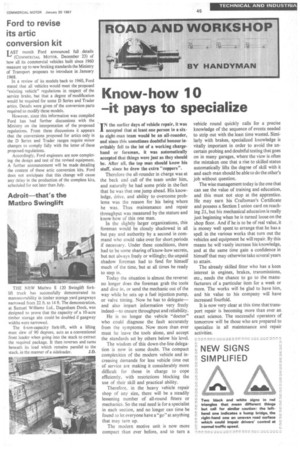Know-how 10 -it pays to specialize
Page 47

If you've noticed an error in this article please click here to report it so we can fix it.
IN the earlier days of vehicle repair, it was accepted that at least one person in a sixto eight-man team would be an all-rounder, and since this sometimes doubtful honour inevitably fell to the lot of a working chargehand or foreman, it was automatically accepted that things were just as they should be. After all, the top man should know his stuff, since he drew the extra "coppers".
Therefore the all-rounder in charge was at the beck and call of the team under him, and naturally he had some pride in the fact that he was that one jump ahead. His knowledge, drive, and ability to overcome problems was the reason for his being where he was. Thus maintenance and repair throughput was measured by the stature and know-how of this one man.
In the slightly larger organizations, this foreman would be closely shadowed in all but pay and authority by a second in command who could take over for short periods if necessary. Under these conditions, there had to be some sharing of know-how secrets, but not always freely or willingly; the unpaid shadow foreman had to fend for himself much of the time, but at all times be ready to step in.
Today the situation is almost the reverse: no longer does the foreman grab the tools and dive in, or send the mechanic out of the way while he sets up a fuel injection pump, or valve timing. Now he has to delegate— and also impart information very freely indeed—to ensure throughput and reliability.
He is no longer the vehicle "doctor" who could diagnose the fault accurately from the symptoms. Now more than ever must he leave the tools alone, and accept the standards set by others below his level.
The wisdom of this down-the-line delegation is now in some doubt. The compact complexities of the modern vehicle and increasing demands for less vehicle time out of service are making it considerably more difficult for those in charge to cope efficiently. with restrictions blocking the use of their skill and practical ability.
Therefore, in the heavy vehicle repair shop of any size, there will be a steadily lessening number of all-round fitters or mechanics. So the real need is for a specialist in each section, and no longer can time be found to let everyone have a "go" at anything that may turn up.
The modern motive unit is now more compact than ever before, and to turn a
vehicle round quickly calls for a precise knowledge of the sequence of events needed to strip out with the least time wasted. Similarly with brakes, specialized knowledge is vitally important in order to avoid the uncertain probing and doubtful testing that goes on in many garages, where the view is often the mistaken one that a rise to skilled status automatically lifts the degree of skill with it and each man should be able to do the other's job without question.
The wise management today is the one that can see the value of training and education, and this must not stop at the apprentice. He may earn his Craftsman's Certificate and possess a Section I union card on reaching 21, but his mechanical education is really just beginning when he is turned loose on the shop floor. And if he is to be of real value, it is money well spent to arrange that he has a spell in the various works that turn out the vehicles and equipment he will repair. By this means he will vastly increase his knowledge, and at the same time gain a confidence in himself that may otherwise take several years to attain.
The already skilled fitter who has a keen interest in engines, brakes, transmissions, etc., needs the chance to go to the manufacturers of a particular item for a week or more. The works will be glad to have him, and his value to his company will have increased fourfold.
It is now very clear at this time that transport repair is becoming more than ever an exact science. The successful operators of tomorrow will be those who are prepared to specialize in all maintenance and repair activities.




























































































































